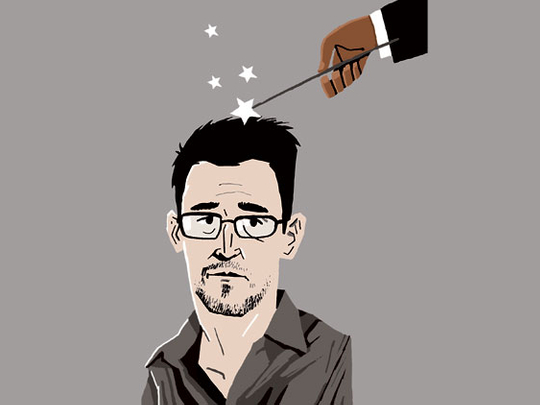
In his second inaugural address, US President Barack Obama called upon “We, the People” to preserve America’s ideals of individual freedom and equality. When Edward Snowden disclosed the National Security Agency’s (NSA) secret surveillance programmes, he was rising to this challenge. Like the nation’s “founding fathers”, he was also defying the usurpations of an increasingly intrusive government. Obama should, therefore, call off the campaign to apprehend him and offer Snowden a pardon instead.
Snowden stands accused of stealing government property and unauthorised dissemination of classified information, but he did not pass valuable secrets to a foreign government or sell them for personal gain — as convicted spies such as Aldrich Ames or Jonathan Pollard did. On the contrary, he gave up a well-paid job and put his own freedom in jeopardy for a principle.
Snowden’s motives were laudable: He believed fellow citizens should know their government was conducting a secret surveillance programme enormous in scope, poorly supervised and possibly unconstitutional. He was right.
Thanks to Snowden, we now know that officials and private contractors have been collecting vast amounts of information about ordinary Americans and conducting unprecedented levels of spying on US allies. We know key officials lied on Capitol Hill about what the NSA was doing, casting doubt on the quality of Congressional oversight. By going public, Snowden reminded us that secret programmes undertaken in the name of national security are extremely difficult to control.
NSA defenders argue that these programmes only target individuals who may pose a threat. They maintain ordinary citizens, whose digital records may be incriminating or embarrassing, need not be concerned because government officials will never examine their data without probable cause and judicial approval.
How naive. Under the veneer of “national security”, government officials can use these vast troves of data to go after anyone, questioning what they were doing, including whistleblowers, investigative journalists or ordinary citizens posting comments on news websites.
Once a secret surveillance system exists, it is only a matter of time before someone abuses it for selfish ends. Richard Nixon kept his own “enemies list” and used the Central Intelligence Agency to spy on American citizens. Former Federal Bureau of Investigation director, J. Edgar Hoover, helped keep himself in office by collecting dirt on officials.
Fear of exposure threatens to stifle the dissent and debate that is essential to healthy democracy. Governments already classify much of what officialdom is doing and selectively leak information to influence public opinion, so citizens must rely on journalists, academics and principled individuals such as Snowden to find out what our “public servants” are not telling us. However, if critical voices are cowed by the possibility that their personal lives will be revealed, those in power will be harder to monitor and policy errors will go uncorrected.
Pardoning Snowden will surely provoke howls of protest from the intelligence community, which hopes to deter future leakers by making an example of him. But a pardon for him is unlikely to trigger a wave of imitators. How many other insiders will sacrifice their jobs and risk their freedom because Snowden got a reprieve? And if a few do follow suit and expose government wrongdoing, society as a whole will benefit.
History will probably be kinder to Snowden than to his pursuers and his name may one day be linked to the other brave men and women — Daniel Ellsberg, Martin Luther King Jr, Mark Felt, Karen Silkwood and so on — whose acts of principled defiance are now widely admired.
Ironically, less august company awaits Snowden, should he join the ranks of those whom presidents have spared. Gerald Ford pardoned Richard Nixon, George H.W. Bush pardoned the officials who conducted the illegal Iran-Contra affair and Obama has already pardoned several convicted embezzlers and drug dealers. Surely, Snowden is as deserving of mercy as these miscreants. Pardoning him will also show that Obama’s rhetorical commitment to “We, the People”, and to open and transparent government, is not just empty words.
— Financial Times
Stephen Walt is a professor of International Affairs at Harvard.









